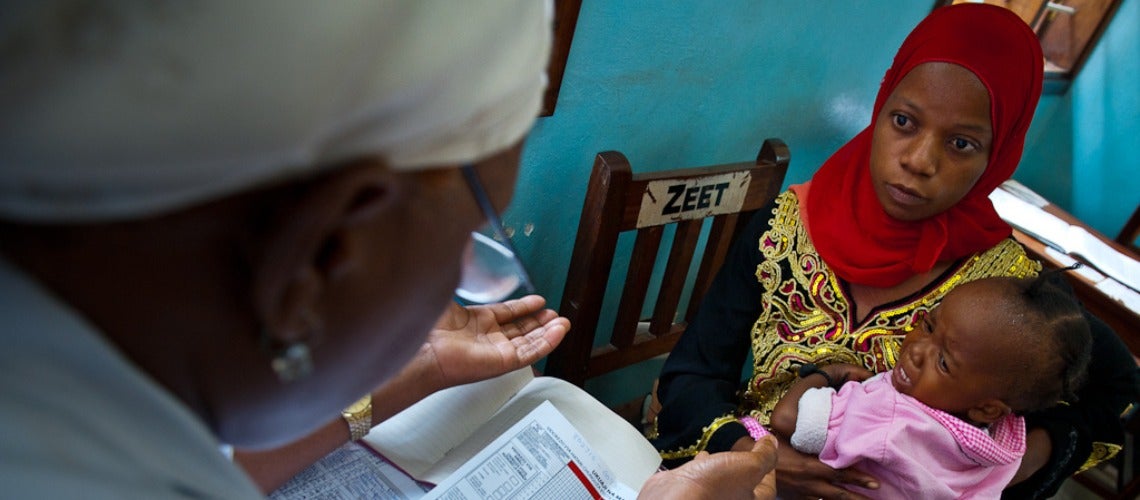 Stronger, inclusive health systems can help ensure continuity and quality in health services delivery, increase citizens’ well-being and health outcomes and advance toward UHC. Photo: Arne Hoel/World Bank.
Stronger, inclusive health systems can help ensure continuity and quality in health services delivery, increase citizens’ well-being and health outcomes and advance toward UHC. Photo: Arne Hoel/World Bank.
The COVID-19 pandemic strained health systems around the world and disrupted the delivery of health services, including maternal and child health care. It also slowed down progress toward universal health coverage (UHC). As the world marks UHC Day, we look at four priorities to ensure that low- and middle-income countries can resume progress toward providing affordable health care for all – a key health objective under 2030 Sustainable Development Goal 3.
Universal health coverage requires inclusive policies that enable all people, including the poorest and most vulnerable, to access quality health care without incurring financial hardship. To implement fair and equitable health strategies that leave no one behind, countries must also address the weaknesses in their health systems exposed by the pandemic to improve resilience. Here are four priority actions to ensure health care for all:
1. Strengthening health systems
In many countries, COVID-19 had a devastating impact on the delivery of essential health services, from routine childhood vaccinations to treatment for chronic non-communicable diseases. By revealing the flaws in health systems and emergency responses, the pandemic has provided a roadmap for change that countries can implement to safeguard their citizens’ lives and welfare. As a first step, governments must strengthen their health systems, particularly by reimagining primary health care (PHC), to ensure that access to health care is maintained during emergencies and people can get the help they need. They should act now to ensure their health systems are resilient and can withstand future crises. Urbanization, climate change, conflict and zoonotic spillovers are among risk drivers that increase the likelihood of another pandemic.
The World Bank is working with low- and middle-income countries to make health systems more resilient to shocks and agile enough to adapt rapidly to changing circumstances. Our recent report calls for solid, evidence-based health governance, and the ability to learn lessons from past emergencies, are also critical to building robust health institutions and contributing to the overall agenda of fair, equitable access to health services. Together with the Global Financing Facility for Women, Children and Adolescents (GFF) we push for better outcomes in reproductive, maternal, newborn, child, and adolescent health and nutrition – especially during crisis.
2. Improving pandemic preparedness
COVID-19 has demonstrated the need to bolster pandemic prevention, preparedness and response (PPR) by investing in disease surveillance and early response capacity to prevent the spread of epidemics. Measures such as expanding the community health workforce and building multi-disciplinary competencies, including in fields like epidemiology, contact tracing and control, contribute to these efforts. Risk communication and community engagement help build trust and partnerships. We promote an integrated, One Health, cross-sectoral approach that incorporates veterinary science, agriculture, food production and environmental protection to prevent and mitigate the impact of public health emergencies. In Africa, for example, we are helping to enhance regional cooperation against infectious diseases through the Regional Disease Surveillance Enhancement (REDISSE) and through our support to the Africa Center for Disease Control.
3. Stepping up quality health care for all
Achieving the goal of health care for all rests on strengthening primary health care, which is the foundation of UHC. In many countries, the pandemic has exacerbated inequalities in access to health and undermined progress toward these objectives. In addition to expanding the availability of PHC services, countries must also enhance the quality of health care by increasing and training the health workforce, reorganizing service delivery to boost efficiency, setting quality benchmarks and engaging with the community to ensure that primary health institutions fully address patients’ needs. Making primary health care more resistant to external shocks will give new momentum to the UHC agenda and achieve better health outcomes.
4. More and better financing
The economic impact of the pandemic and rising interest rates on public debt are expected to constrain many countries’ capacity to allocate more resources to health and invest in improving their overstretched health institutions, as our recent update on health financing showed. These financial challenges risk undermining prospects for health and economic recovery. Our $34 billion global health portfolio includes over 240 projects that help countries take a comprehensive approach to improving health outcomes, especially for poor and vulnerable people, by strengthening primary care and key public health functions.
We will continue to support low- and middle-income countries’ efforts to improve health resilience by providing funding for health programs through IDA, our fund for the poorest countries and complementary instruments such as the Health Emergency Preparedness and Response Program (HEPR), which had awarded 34 grants worth $117 million as of June 2022. The newly created Pandemic Fund, hosted at the World Bank, will provide long-term financing to boost health systems resilience in developing countries and help them prepare for future public health emergencies.
Investments in health systems capacity building and PPR deliver long-term dividends by limiting the human and economic costs of future emergencies. With stronger, inclusive health systems, countries can ensure continuity and quality in health services delivery, increase their citizens’ well-being and health outcomes, and advance toward UHC, which is key to ending extreme poverty and increasing equity and shared prosperity.


Join the Conversation